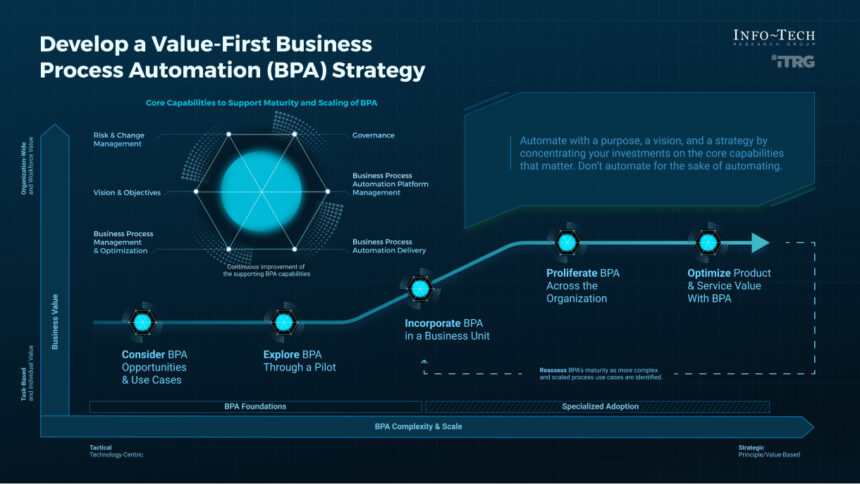In the digital age, businesses are increasingly adopting automation to streamline their operations, reduce costs, and improve efficiency. Business Process Automation (BPA) is no longer just a trend; it is a strategic approach to improving the way companies function. However, successfully implementing BPA can be complex and requires expertise. This is where business process automation consulting comes in.
Business process automation consulting helps organizations design, implement, and optimize automated workflows to improve operational efficiency. In this article, we will explore key strategies for successful consulting and how businesses can benefit from the expertise of business process automation consultants.
What Is Business Process Automation Consulting?
Business process automation consulting refers to professional services that help businesses automate their repetitive and rule-based processes. The goal of BPA is to reduce manual effort, minimize errors, and speed up operations. A business process automation consultant typically works with organizations to identify processes that can be automated, select the right automation tools, and ensure a seamless integration with existing systems.
These consultants bring deep knowledge of automation technologies, workflow optimization, and industry best practices. By leveraging their expertise, companies can implement automation solutions that align with their strategic goals and drive measurable improvements.
Benefits of Business Process Automation Consulting
- Expert Guidance: Consultants bring specialized knowledge and experience to the table, helping businesses avoid common pitfalls and implement automation solutions effectively.
- Customized Solutions: Business process automation consultants tailor solutions to the specific needs of each business, ensuring that automation initiatives align with organizational goals.
- Efficiency Gains: Consultants help businesses streamline workflows, reduce redundancy, and automate tasks that traditionally required significant manual effort.
- Cost Reduction: By automating repetitive tasks, businesses can lower labor costs, reduce human errors, and improve resource allocation.
Key Strategies for Successful Business Process Automation Consulting
Implementing business process automation effectively requires careful planning and execution. Below are the key strategies that business process automation consultants use to ensure success:
1. Identifying the Right Processes for Automation
The first step in any business process automation consulting engagement is identifying the processes that are most suited for automation. Not all processes in a business are candidates for automation. The ideal candidates are those who are:
- Repetitive: Tasks that require slight variation and can be repeated without deviation.
- Rule-based: Processes that follow clear, established rules or guidelines.
- Time-consuming: Tasks that require significant manual effort, leading to inefficiencies.
- Data-heavy: Processes that involve large amounts of data entry, extraction, or processing.
Examples of processes that are often automated include:
- Invoice processing
- Data entry and validation
- Customer support ticket management
- HR onboarding and document management
By focusing on these processes, business process automation consultants help companies see immediate improvements in efficiency and productivity.
2. Aligning Automation with Business Goals
One of the most critical aspects of business process automation consulting is ensuring that automation efforts align with the overall business strategy. Consultants work closely with business leaders to understand their goals and objectives. This ensures that the chosen automation solutions not only streamline operations but also contribute to the long-term success of the organization.
For example, if a company’s goal is to enhance customer satisfaction, automation in customer support can lead to faster response times and more accurate issue resolution. By aligning automation efforts with business objectives, consultants ensure that the implementation drives tangible results.
3. Choosing the Right Automation Tools
With a wide range of business process automation software available in the market, selecting the right tools is crucial. Business process automation consultants have the expertise to evaluate different automation solutions and recommend the best fit for the organization’s needs.
Factors to consider when choosing automation tools include:
- Ease of integration: The automation tool should seamlessly integrate with the organization’s existing systems and workflows.
- Scalability: The solution should be able to grow with the business, handling increased volumes of work as the company expands.
- User-friendliness: The tool should be easy for employees to use, with minimal training required.
- Customization: The automation solution should be flexible enough to adapt to the business’s specific needs.
By leveraging their knowledge of various automation tools, business process automation consultants help businesses choose a solution that meets their unique requirements and objectives.
4. Mapping Out the Automation Workflow
Once the right processes and tools have been identified, the next step is to map out the automation workflow. Business process automation consultants work with the company’s teams to design the ideal workflow that eliminates bottlenecks and reduces manual intervention.
Key steps in mapping out an automation workflow include:
- Documenting current processes: Consultants start by understanding the current state of the processes to be automated, identifying inefficiencies, redundancies, and areas for improvement.
- Defining automation rules: Consultants work with stakeholders to determine the rules that the automated processes should follow. These rules govern how tasks are carried out, ensuring consistency and accuracy.
- Designing the workflow: The workflow design includes outlining each step of the automated process, from initiation to completion. This ensures that the automation solution aligns with the organization’s operational needs.
By meticulously designing the automation workflow, consultants ensure a smooth transition and effective implementation.
5. Managing Change and Training Employees
Implementing business process automation can significantly change how employees work. It’s essential to manage this transition carefully. Business process automation consultants play a key role in guiding employees through the change process.
Strategies for managing change include:
- Communicating the benefits: Consultants work with leaders to communicate the value of automation to employees. This helps employees understand how automation will improve their work, rather than replace it.
- Training and upskilling: Providing training on how to work with the new automation tools is essential for ensuring a smooth transition. Consultants help create training programs that educate employees on using the automation tools effectively.
- Providing ongoing support: Consultants offer continued support and troubleshooting to address any issues or concerns that arise post-implementation.
By focusing on change management and employee engagement, business process automation consultants help ensure that the automation project is embraced across the organization.
6. Testing and Iteration
Before fully rolling out business process automation, consultants conduct extensive testing to ensure that the automation workflows are working as expected. This includes:
- Unit testing: Ensuring each individual task within the workflow is automated correctly.
- Integration testing: Testing the automation system’s integration with existing tools and systems.
- User acceptance testing (UAT): Involving end-users to verify that the automation solution meets their needs and expectations.
After testing, consultants analyze the results and make any necessary adjustments to optimize the automation solution. This iterative process ensures that the final implementation is effective and efficient.
Business Process Automation Consultants: Key Considerations for Hiring
When seeking business process automation consultants, it’s essential to find professionals with the right skills and experience. Below are some factors to consider when choosing business process automation consultants:
- Experience and expertise: Look for consultants with a proven track record in implementing automation solutions across industries.
- Industry knowledge: Consultants familiar with your specific industry will have a better understanding of your business challenges and compliance requirements.
- Technical proficiency: Business process automation consultants should have in-depth knowledge of various automation tools, including RPA, AI-driven solutions, and cloud-based systems.
- Customization skills: Ensure that the consultants can tailor solutions to your organization’s specific needs, rather than offering one-size-fits-all solutions.
- Change management expertise: Effective consultants understand the importance of managing organizational change and ensuring successful adoption of automation.
Conclusion
Business process automation consulting is essential for businesses looking to improve operational efficiency and gain a competitive edge. By working with skilled consultants, organizations can identify the right processes to automate, choose the best tools, and design effective workflows that align with their strategic goals.
The expertise of business process automation consultants ensures a smooth transition to automation and helps businesses achieve significant improvements in speed, accuracy, and cost savings. With the right approach and guidance, automation can transform your business and drive long-term success.


